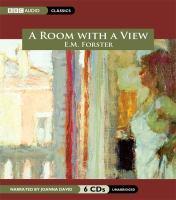
I'm a regular reader of classic literature, and I've enjoyed Merchant-Ivory films based on E.M. Forster novels in the past, so I'm not sure why I had the impression that his work was stuffy. Imagine my surprise when I found myself laughing out loud while listening to the audiobook of A Room with a View--and actually describing it repeatedly to one of my friends as "hilarious."
In the first half of the novel, Lucy and her Aunt Charlotte are visiting Florence, and their lives unwittingly become entangled with those of their fellow English travelers, particularly an unconventional father and son duo called Mr. Emerson and George. Lucy keeps falling into the company of George Emerson, and when he finally kisses her--against her will--Charlotte whisks her off to Rome. The second half of the novel finds the tourists back home in England, and Lucy has become engaged to Cecil, whom she and Charlotte met while in Rome. Through a combination of coincidence and Cecil's interference, Mr. Emerson and George soon move to the neighborhood, and Lucy must decide between Cecil and George once and for all.
The novel's comedic elements are the epitome of a comedy of manners. First, Forster invites us to be amused by the habits of English tourists abroad, particularly their cultural obliviousness and insensitivity. For example, Lucy clings to her Florence guidebook as an absolute authority on what's important and worthwhile, and what her opinion should be. So when she finds herself touring a church without her precious travel guide, she has no idea which paintings to look at, or what she should think of the ones she does see. She never seems to consider taking things at face value and forming her own opinions.
The other comedic theme is the clash of Victorian values and the more modern, egalitarian values held mostly (though not exclusively) by the novel's younger characters. When new, inexpensive semi-detached houses are built in Lucy's hometown, many of the villagers, including her mother, are worried that such cheap lodgings are bound to attract "the wrong sort." Like Lucy, Cecil finds this attitude snobbish and old-fashioned, but he reveals his own superciliousness when he meets George and Mr. Emerson in the National Gallery in London, and then invites them to move in to one of the new houses. He doesn't invite them because he likes them or wants to help them, but rather because he knows they are exactly "the wrong sort" that everyone is worrying about, and he takes pleasure in the idea of irritating all of the old fuddy-duddies. His plan, of course, backfires by drawing Lucy and George together again.
Finally, since I listened to the audiobook, I should mention the narration. I am easily put off by many audiobook narrators because I find a lot of voices irritating, and narrators who try too hard to give different voices or accents to all the characters distract me from the plot. This audiobook's narrator, Joanna David, however, I found to be completely unobtrusive and a good neutral conduit for the delightfully amusing story.
